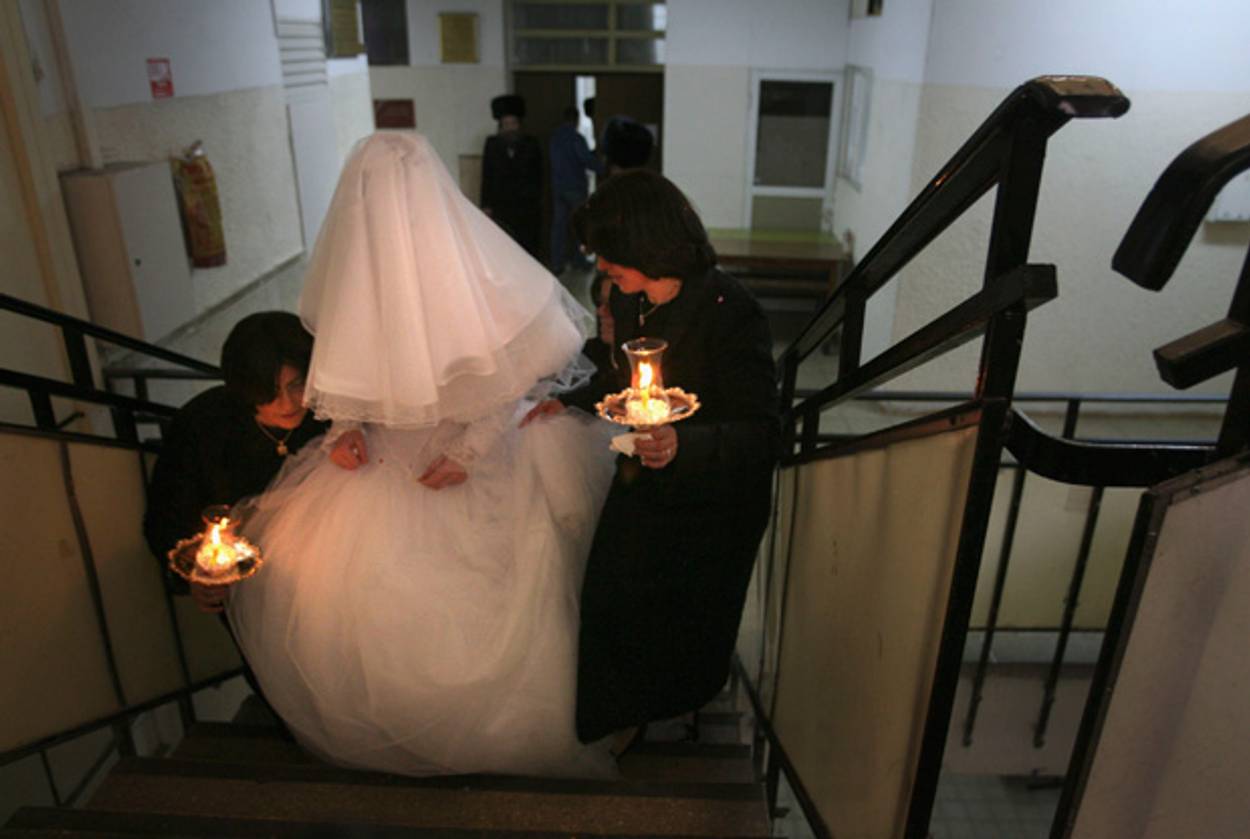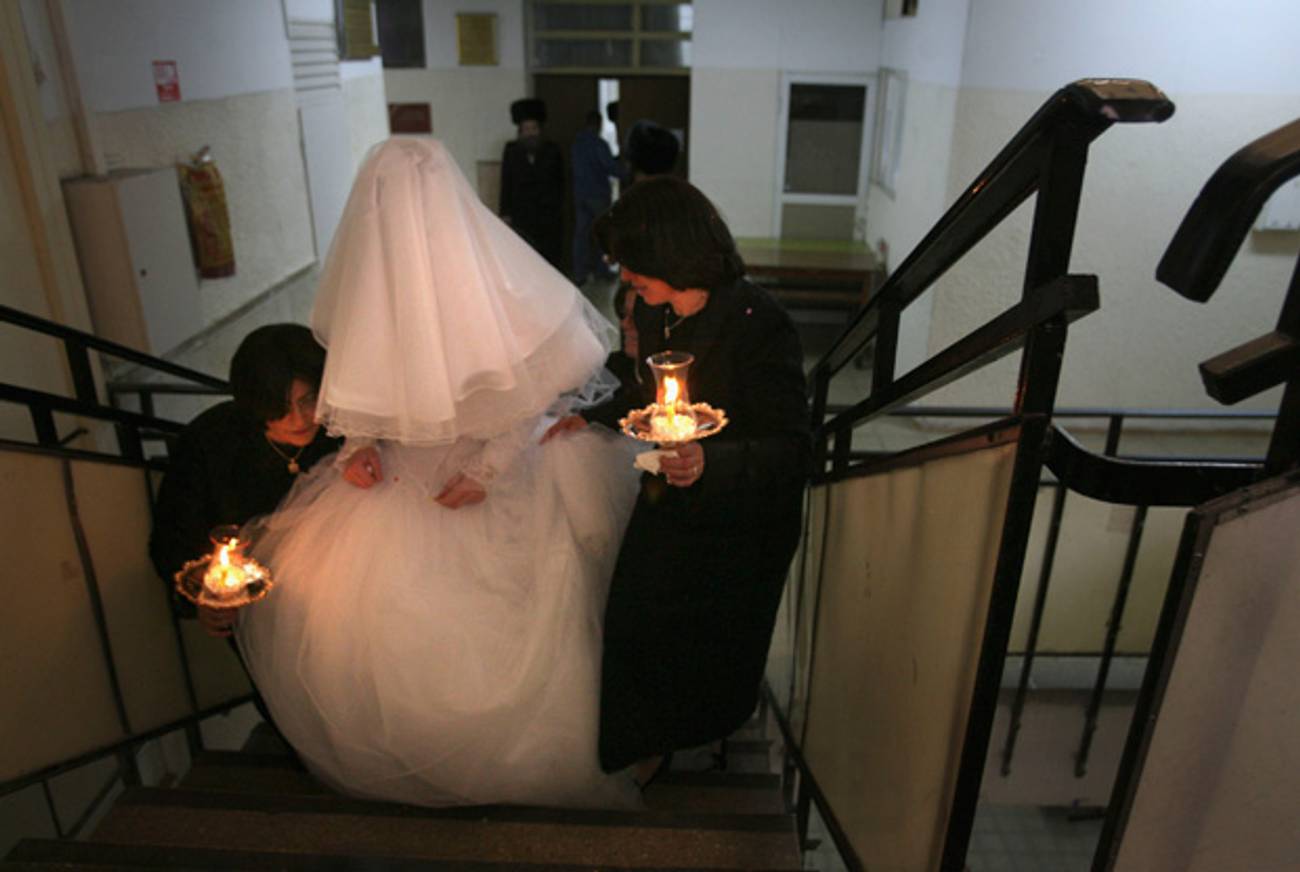The Feminist Marriage Plot
The attacks on domestic bliss in Alix Kates Shulman’s novel Ménage would resonate with Orthodox Jews




Recently, while in a graduate class on Jane Austen’s Emma, it dawned on me that Austen’s England has a lot in common with Hasidic Brooklyn, where I was raised. After all, Victorian women had virtually no options outside of marriage, and much the same can be said for women living in contemporary ultra-Orthodox communities. But the notion of marriage as key to happiness can’t be true of progressive, enlightened women in the West—or can it? That’s the question asserted by Ménage, a new novel by the feminist activist and author Alix Kates Shulman that sets out to expose the myth of marital bliss.
The novel tells of Heather and Mack, a couple that seems to have it all: She’s good looking, he’s financially successful, and together they have two kids and a beautiful house in the suburbs. But from the outset the reader senses frustration and discontent festering behind the white picket fence. While Mack takes lengthy business trips away from home, Heather recalls with nostalgia and not a little regret her post-college career in the publishing industry, and the path toward literary success that she veered away from by getting married and having kids. Shulman’s novel raises important questions about our expectations of marriage in the 21st century and has surprising implications for the Orthodox approach to matrimony.
***
Questions of marriage have long occupied Shulman, who first made waves with her essay “A Marriage Agreement” in 1972. Written as a contract of sorts, the agreement laid out the terms for a fair division of labor between husband and wife in all matters relating to household chores and childcare. While ostensibly written to address her own marriage—which eventually ended in divorce—the agreement was widely read and drew strong reactions, including, famously, a mocking critique from Norman Mailer who insisted that he would not be married to such a woman. For Mailer, the idea of helping his wife with the dishes—and allowing his own work to suffer as a result—was anathema. Shulman revisited the essay in a 1998 piece called “Marriage Disagreement,” where, in response to Mailer’s critique, she noted that according to the agreement’s foundational principle “a woman’s work was, by definition, as valuable as a man’s.”
But it was her novel Memoirs of an Ex-Prom Queen that brought her literary stardom and fame. Covering many hot-button issues of the feminist movement, the book focused in particular on the ways in which women are objectified. Recounting her tale of adventure and misadventure, the heroine, Sasha Davis, repeats over and over again what she has imbibed from those around her—her mother, lovers, female rivals—that her “looks were everything,” they were her “only asset.” And, as looks will, they were fast slipping away.
In her newest book, the plot thickens when Mack, in a quest to assert himself and also provide for his wife, invites an enigmatic, sexy, European writer to take up residence in the family home—in exchange for keeping Heather company, “intellectually,” of course. While the plot ultimately falls flat, Shulman powerfully evokes her heroine’s sense of entrapment in what, to all outer appearances, would seem an ideal marriage. In reality, Mack is unfaithful while away, and Heather, alone at home, simmers with suspicion and resentment. More than once, she imagines her husband dead, a thought she finds not altogether unappealing: “If Mack died, she would sell the house and live off the proceeds—buy herself a loft, eat brunches at Balthazar, shop at the Farmers’ Market, cruise the Chelsea galleries.” On another occasion, the sound of the phone ringing, late at night, while Mack is away, sends Heather into a panic: “Emergency? An official announcement of Mack’s sudden death? She hoped she hoped not, but wouldn’t bet on it.” She continues:
His death would certainly shake things up, lift the doubt that had settled over her like mist in the valley, allowing her to see ahead to some decisive act. If he suddenly died she’d sell the house, buy a condo in the city, find a good school for the kids and enroll in the best MFA program she could get into. Or take a live-in-lover and stay on here to write. If their father died in an accident, the children couldn’t blame her—how often did they see him anyway?—though part of her believed there are no accidents.
As in “Memoirs” in her latest novel, too, Shulman writes of feminine beauty as a sort of double-edged sword in a world where sexiness and seriousness are often seen as mutually exclusive—for women. You might think that in religious circles physical appearances would count for less, but in a world where mingling of the sexes is mostly verboten, looks—which constitute first impressions, for better or worse—do matter, very much so. Ten years later, I’m still horrified to recall the time I went to shul on a Friday night for the express purpose of having someone—the sister of a potential date—check me out. Given that the whole dating process was shrouded in secrecy she would not approach me, even to make small talk. And so, there I stood, me and my wares—made up, nicely dressed, heels and all—pretending not to watch as she sized me up.
A friend who is raising two young daughters in a Modern Orthodox community worries that the truths—about marriage and family—that she grew up with won’t hold water for her own kids. Given the scarcity of eligible men today, she laments, what are the odds of her daughters finding their besherts, and should she, as a responsible mother, be providing her daughters with the tools that will make them happy, productive women whether or not they ever wed?
I married a man I adore—without the help of a matchmaker, or a meddlesome sister—and not long afterwards gave birth to our son. I love my husband and son dearly, but God help me (or all three of us) if my happiness was based on them.
Still, when I spend time with my single female friends, I find myself struck with the urge to fix them up. Even as I envy them their freedom, it’s hard to shake off the notion—ingrained in me since childhood—that marriage is a cure-all for life’s ills. I was raised to believe getting married and having children was the surest way—the only way—to secure one’s happiness. And despite my growing conviction that happiness is a state of mind that has little to do with marital status, I want to believe that by pairing up my friends with Mr. Right I can help them find fulfillment.
***
Like this article? Sign up for our Daily Digest to get Tablet Magazine’s new content in your inbox each morning.
Shoshana Olidort is a PhD candidate in Comparative Literature at Stanford University. Her work has appeared in the Los Angeles Review of Books, The Paris Review, and The Jewish Review of Books, among other publications.
Shoshana Olidort is a PhD candidate in Comparative Literature at Stanford University. Her work has appeared in the Los Angeles Review of Books, The Paris Review, and The Jewish Review of Books, among other publications.